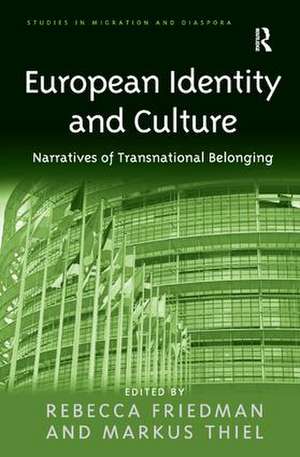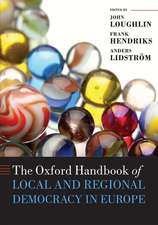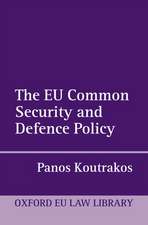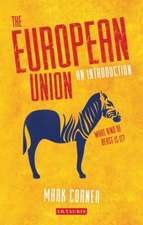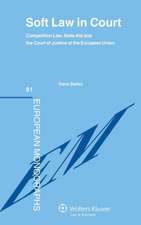European Identity and Culture: Narratives of Transnational Belonging
Autor Markus Thiel Editat de Rebecca Friedmanen Limba Engleză Hardback – 28 mai 2012
| Toate formatele și edițiile | Preț | Express |
|---|---|---|
| Paperback (1) | 482.62 lei 6-8 săpt. | |
| Taylor & Francis – 9 sep 2016 | 482.62 lei 6-8 săpt. | |
| Hardback (1) | 1056.28 lei 6-8 săpt. | |
| Taylor & Francis – 28 mai 2012 | 1056.28 lei 6-8 săpt. |
Preț: 1056.28 lei
Preț vechi: 1288.15 lei
-18% Nou
Puncte Express: 1584
Preț estimativ în valută:
202.15€ • 209.44$ • 168.70£
202.15€ • 209.44$ • 168.70£
Carte tipărită la comandă
Livrare economică 22 martie-05 aprilie
Preluare comenzi: 021 569.72.76
Specificații
ISBN-13: 9781409437147
ISBN-10: 1409437140
Pagini: 200
Dimensiuni: 156 x 234 x 13 mm
Greutate: 0.5 kg
Ediția:1
Editura: Taylor & Francis
Colecția Routledge
Locul publicării:Oxford, United Kingdom
ISBN-10: 1409437140
Pagini: 200
Dimensiuni: 156 x 234 x 13 mm
Greutate: 0.5 kg
Ediția:1
Editura: Taylor & Francis
Colecția Routledge
Locul publicării:Oxford, United Kingdom
Notă biografică
Rebecca Friedman is an Associate Professor of History and Co-Director of the Miami-Florida European Union Center of Excellence (MEUCE) at Florida International University. She is author of Masculinity, Autocracy and the Russian University and co-editor of Russian Masculinities in History and Culture. Markus Thiel is Assistant Professor in the Department of Politics and International Relations at Florida International University. He is author of The limits of Transnationalism in the EU and co-editor of both Diversity in the European Union and Identity Politics in the Age of Globalization.
Recenzii
'An inspiring and welcome new addition to the literature on European identity and culture by a distinguished group of interdisciplinary scholars. All authors engage with the question of transnational European belonging and European integration in a series of empirical case studies, making the volume as a whole an interconnecting exploration of the different processes and practices of cultural identity formation.' Ulrike Hanna Meinhof, University of Southampton, UK 'A valuable addition to the debate about European identity, filling in many of the gaps in the meaning of the term. The contributors come from multiple disciplinary perspectives and offer new insights into the formation and manifestation of European identity, with a particularly useful emphasis on the too-often overlooked role of political culture.' John McCormick, Indiana University, USA '... a very timely volume. It brings together academics from a variety of humanity and social science backgrounds to challenge our understanding of identity and its formation. Throughout, an emphasis is placed upon the cultural aspects of identity formation. The book’s main conceptual contribution lies in its advancement of the processural character of transnational identity formation. Unlike much of the literature before it, which is still wedded to a predominantly statist as well as static paradigm (p.2), this volume’s authors present a more dynamic conception of transnational identity, one which is in flux and changing over time. In doing so, the authors set out to elucidate some of the more subtle, shifting dynamics that evade quantitative static analyses of identity formation (p.3). They have certainly achieved their aim... These findings ought to be read by anyone thinking about how a truly transnational European public sphere might be developed... While there are no simple answers to Europe’s identity crisis, I would thoroughly recommend this book to those brave enough to take up the chall
Cuprins
Chapter 1 Introduction: Culture and Narratives of Transnational Belonging, Markus Thiel, Rebecca Friedman; Chapter 2 Cultural Formations of the European Union: Integration, Enlargement, Nation and Crisis, Michael D. Kennedy; Part I European Integration and Political Cultures; Chapter 3 National Identification, Social Belonging and Questions on European Identity, Sophie Duchesne; Chapter 4 Modeling the Process of Political Part Icipation in the EU; Chapter 5 Culture, Communication and Currency: Constructing a Public Sphere for the Euro, Matthias Kaelberer; Part II Cultural Practices in Everyday Life; Chapter 6 1This chapter is based upon a qualitative and inductive type of research conducted over a period of twenty years in the fields of anthropology and sociology of food and terroir and is also the result of several interviews and discussions held in different forums with wine and food producers in France and Europe. See also )., Marion Demossier; Chapter 7 Islamoskepticism and its Counter-Narratives: Transnational Identity, Cultural Wars, and Religion’s Place, Raymond Taras; Chapter 8 Tourism, Transnationalism, and the Construction of Everyday Life in Europe, Dario Gaggio; conclusion Conclusion, Rebecca Friedman, Markus Thiel;
Descriere
Exploring attempts by various actors - institutions, groups, individuals - to create transnational European identities, European Identity and Culture scrutinizes the cultural formations that have either reignited or emerged in often contradictory relations to the EU project, including local, regional and transnational allegiances.
